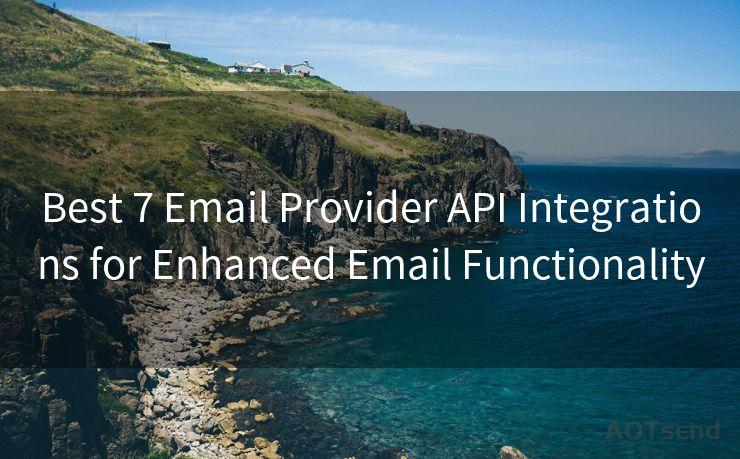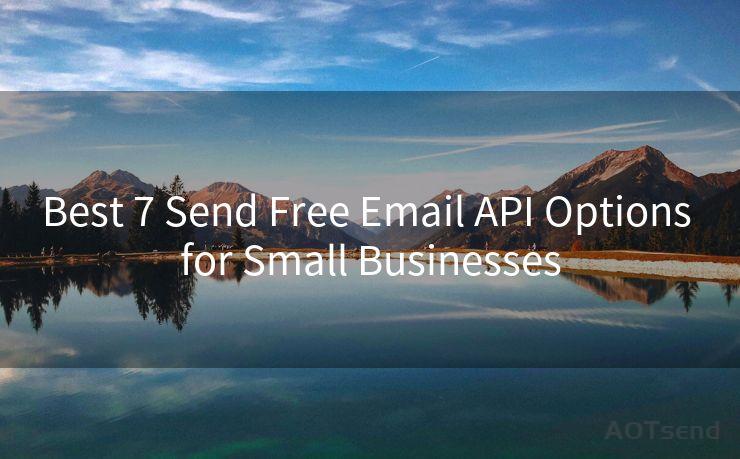19 API For Sending Mail Best Practices
Hello everyone, I’m Kent, the website admin. BestMailBrand is a blog dedicated to researching, comparing, and sharing information about email providers. Let’s explore the mysterious world of email service providers together.




Introduction
In the digital age, emails have become a crucial communication tool, especially for businesses. When integrating email functionality into applications or services, using APIs (Application Programming Interfaces) for sending mail is a common and efficient approach. However, to ensure reliable and effective email delivery, it's essential to follow best practices. This article explores the top 19 best practices for using APIs to send emails.
1. Choose a Reliable Email Service Provider
Selecting a reputable email service provider (ESP) with a robust API is crucial. Look for providers with high deliverability rates, excellent customer support, and advanced features like analytics and tracking.
2. Understand the API Documentation
Before integrating any email API, thoroughly read and understand its documentation. This ensures you're using the API correctly and avoiding common pitfalls.
3. Authenticate Your Emails
Implementing authentication protocols like SPF (Sender Policy Framework), DKIM (DomainKeys Identified Mail), and DMARC (Domain-based Message Authentication, Reporting, and Conformance) is vital for improving email deliverability and reducing the chances of your emails being marked as spam.
4. Optimize Your Email Content

Craft emails with clear, concise content that provides value to recipients. Avoid spammy words or phrases, and use a balanced text-to-image ratio.
5. Manage Your Email Lists
Maintain clean, up-to-date email lists. Regularly remove inactive or bounced email addresses to improve your sender reputation.
6. Send Personalized Emails
Utilize the API's capabilities to personalize emails with recipient names, preferences, or other relevant data. Personalization increases engagement and reduces unsubscribe rates.
7. Test, Test, and Test Again
Regularly test your email campaigns to ensure they render correctly on different devices and email clients. Also, test various subject lines and content to see what resonates best with your audience.
8. Monitor Delivery and Engagement Metrics
Track key metrics like open rates, click-through rates, bounce rates, and unsubscribe rates. Use these insights to refine your email strategy.
9. Handle Unsubscribes Gracefully
Provide an easy way for recipients to unsubscribe, and respect their choices. Forcing unwanted emails on people hurts your sender reputation.
10. Comply With Anti-Spam Regulations
Familiarize yourself with anti-spam laws like CAN-SPAM in the US or CASL in Canada, and ensure your emails comply.
11. Use Double Opt-In for Subscriptions
Implement a double opt-in process for new subscriptions to confirm their interest and reduce spam complaints.
12. Segment Your Audience
Tailor your emails to specific audience segments based on their interests, demographics, or past behavior. Segmentation improves engagement and conversion rates.
13. Optimize for Mobile Devices
Ensure your emails are mobile-friendly, as a significant portion of emails are now opened on mobile devices.
14. A/B Test Your Emails
Utilize A/B testing to compare different subject lines, content, or designs and see which performs better.
15. Send at Optimal Times
Analyze your data to determine the best time to send emails for maximum engagement.
16. Handle Bounces and Complaints
Monitor bounce rates and complaint rates, and take prompt action to address issues.
17. Utilize Automation Wisely
Automation can be powerful, but avoid overusing it. Personalize automated emails as much as possible.
18. Protect User Privacy
Ensure your email practices comply with privacy regulations like GDPR, and securely handle user data.
19. Continuously Learn and Adapt
Email marketing is an evolving field. Stay updated with the latest trends, best practices, and regulations to ensure your email campaigns remain effective.
Conclusion
Following these best practices when using APIs to send emails can significantly improve your email deliverability, open rates, and overall campaign performance. Remember, effective email marketing requires continuous learning, testing, and adaptation to stay relevant and engaging for your audience.




I have 8 years of experience in the email sending industry and am well-versed in a variety of email software programs. Thank you for reading my website. Please feel free to contact me for any business inquiries.
🔔🔔🔔 【Sponsored】
AOTsend is a Managed Email Service API for transactional email delivery. 99% Delivery, 98% Inbox Rate.
Start for Free. Get Your Free Quotas. Pay As You Go. $0.28 per 1000 Emails.
You might be interested in:
Why did we start the AOTsend project, Brand Story?
What is a Managed Email API, How it Works?
Best 24+ Email Marketing Service (Price, Pros&Cons Comparison)
Best 25+ Email Marketing Platforms (Authority,Keywords&Traffic Comparison)
Scan the QR code to access on your mobile device.
Copyright notice: This article is published by AotSend. Reproduction requires attribution.
Article Link:https://www.bestmailbrand.com/post2695.html











